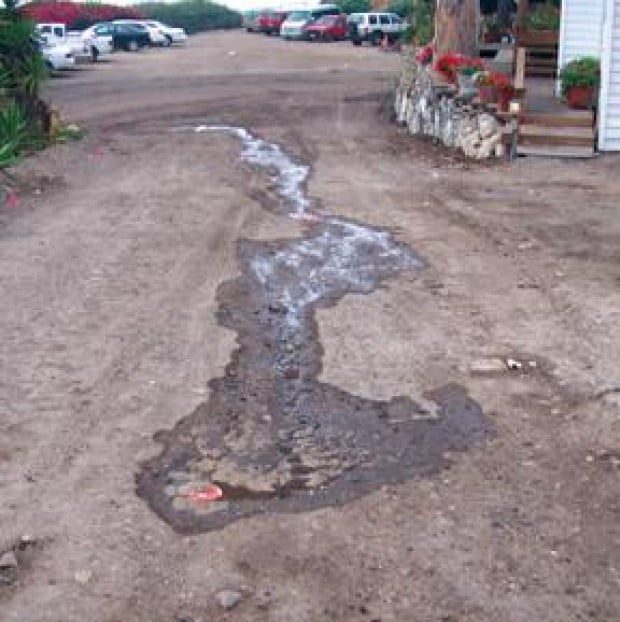
Owner of Paradise Cove Mobile Home Park and tenants have different definitions of “complete” installation of new septic system. Tenants take district attorney on tour of the park.
By Vicky Shere / Special to the Malibu Times
In an environmental crimes lawsuit filed nearly 10 years ago, the Kissel Company got its 14th extension to meet terms of its probation ordered nearly eight years ago.
Malibu Superior Court Judge Lawrence Mira last Friday set an Aug. 17 hearing date to determine whether Kissel had completed installation of a new, on-site septic system at its Paradise Cove Mobile Home Park.
In granting an extension of the probation ordered in December 1999, Mira was balancing testimony by Kissel’s attorney, Richard Regnier, that the upgraded septic system was “fully operational and fully connected” with the need for proof.
The complaint in State of California vs. the Kissel Company was filed January 29, 1998 with 45 counts of health and water code violations for alleged sewage spills in the park, court records show.
Mira had ordered Kissel to design and install a new septic system as a condition of probation on five remaining misdemeanor charges.
Mira had also ordered Kissel to implement a maintenance program to prevent the frequent septic system overflows that were the basis of the lawsuit.
If all conditions are satisfied, Mira can terminate Kissel’s probation and exonerate the maximum $50,000 penalty, Regnier said.
In citing his reasons for the delay, Mira said he preferred that the penalty be used toward defraying costs of the new septic system.
Many park residents, who had endured years of sewage spills and messy construction, were outraged by the claim that the new septic system was completely installed.
“Workers are pumping sewage into trucks today,” said Ray Sheehan, a resident since 1998. “There should be no need for external pumping with the new system.”
To bolster the residents’ case even more, Sheehan took Deputy District Attorney Daniel Wright, who is prosecuting the case, and a reporter to see conditions in the 72-acre park overlooking the ocean.
Sheehan also provided an e-mail from the state of California Regional Water Quality Control Board on its requirements for the new system.
According to the RWQCB e-mail, the “job will not be complete until…all wastewater generated in the Park is being pumped through the collection system to the wastewater treatment plant and all components of the old septic system not utilized in the new collection and distribution system are properly abandoned as required by the Uniform Plumbing Code…
“Even when all homes are connected, [and] all wastewater treatment plant components… are functioning, it is doubtful that Kissel Company will be able to meet the Regional Board definition of complete-final compliance, meeting all discharge limitations for several weeks,” the RWQCB staffer wrote on July 19.
While at the park, residents pointed out damage to the septic system caused by repaving crews, another point noted in the RWQCB e-mail.
“The Board definition of ‘completed’ does not include repaving the roads in the Park, but from what I’ve seen, paving operations have caused tremendous damage to various parts of the wastewater treatment plant, and its collection and distribution system,” the RWQCB staffer wrote.
Getting approvals from various agencies for the new system has accounted for delays in its completion, Kissel president Steven Dahlberg has contended over the years.
Dahlberg, who also toured the park after the July 20 hearing, provided The Malibu Times with his interpretation of Friday’s events.
“The pumping shown by residents Friday afternoon was for abandonment of the old system,” Dahlberg wrote. “The final two tanks of the old system were abandoned Friday.
“In preparing for laying asphalt, septic tanks, pump stations and septic pit lids are often knocked off. The risers are often broken as well,” Dahlberg wrote. “The septic contractor has had a five-man crew on the premises doing nothing but making repairs to assure that the new system remains operational.”
Dahlberg also confirmed reports that the RWQCB might impose fines of up to $9,000 per day: $3,000 per day since Nov. 1, 2006 for failure to complete the new system; $3,000 per day since Dec. 1, 2006 for failing to abandon the old system and $3,000 per day for failing to meet waste discharge requirements for treatment.
“The final amounts are yet to be determined and Kissel disputes the notion that any fines are appropriate,” Dahlberg, who serves on the Board of Directors of Santa Monica Baykeeper, wrote.
